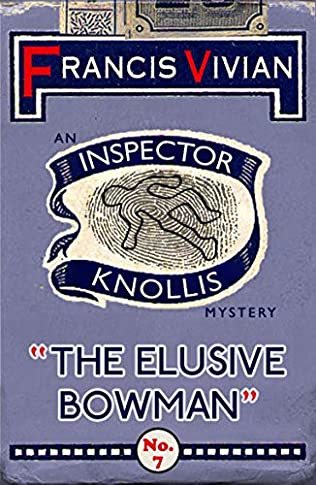The Elusive Bowman

A review of The Elusive Bowman by Francis Vivian
In this, the seventh outing of Inspector Knollis, originally published in 1951 and reissued by Dean Street Press, I learned more about archery from reading this book than I could possibly shake an arrow at. You do not need to be a toxophilite to get into this book, Vivian, the nom de plume of Arthur Ashley, wears his love and knowledge of the sport lightly but the nub of the case revolves around the intricacies of toxophily.
The book does have its drawbacks. The tightness of the plot means that, to be charitable, there are no more than five possible suspects, but Vivian does a fine job in maintaining the tension, shifting the focus on one and then another, leaving the reader as uncertain as the police as to who really did it.
Each of the principal suspects seem to have rock solid alibis and Inspector Knollis is twice on the verge of admitting defeat, once as a tactical ploy to see whether a relaxation of the pressure will provoke a change in behaviour and lead to one of the suspects giving themselves away, and once when he cannot see his way through the impasse. Much of the plot’s development is reliant upon a witness turning up out of the blue with a crucial piece of evidence or a conversation overheard rather than good old-fashioned police work. There is the sense that Vivian has constructed such a perfect crime that he too is struggling to provide Knollis with the keys with which to unlock it.
The finale is dramatic, possibly verging on the melodramatic, and seems quite rushed in comparison to the more languid investigation. On reflection I wonder whether this impression is deliberate, and that the construction of the book is a literary reconstruction of how you fire a bow. There is the careful selection of the arrow, pushing the nock of the arrow on to the string, drawing the bow, taking aim and then releasing the string. All of a sudden, the arrow flies through the air and, if you are lucky, hits the target. If so, it adds a further impressive dimension to a fine and entertaining book, which in my estimation ranks alongside The Singing Masons as one of Vivian’s best.
We meet Michael Maddison at the start of the story, landlord of the Fox Inn in Teverby-On-The-Hills. He lives there with his sister, Rhoda, and his orphaned niece, Gillian. Maddison turns out to be a nasty piece of work and is intent on thwarting the two women’s plans to marry. They both have eyes on Captain Harry Saunders who runs the local archery club. Both the women are keen archers and when Maddison is found in the cellar killed by an arrow through the chest, both women have the motive and skills to have committed murder.
Inevitably, the case is not as simple as that and during the course of his investigations, Knollis discovers blackmail, fraud, a secret marriage, an insomniac Colonel, and a set of rock-solid alibis. Vivian vividly portrays his principal characters, and the reader can readily get a sense of their frustrations, jealousies and reasons for wanting Maddison out of their lives.
If not exactly quivering with excitement the reader who picks up this fine book has a treat in store.



